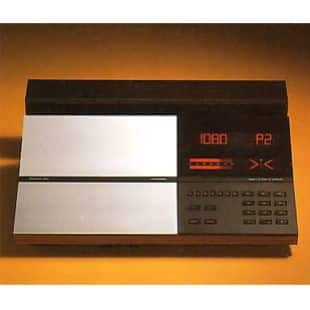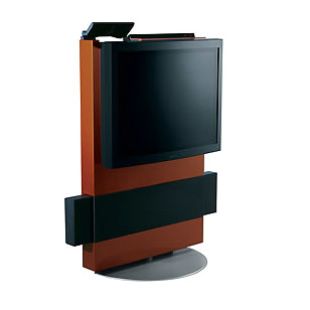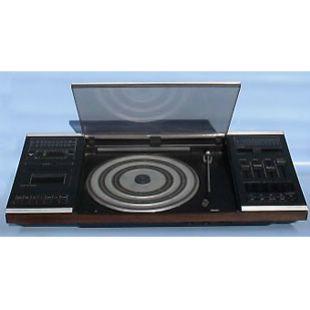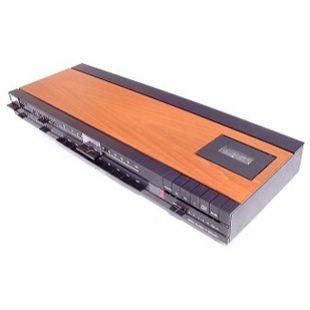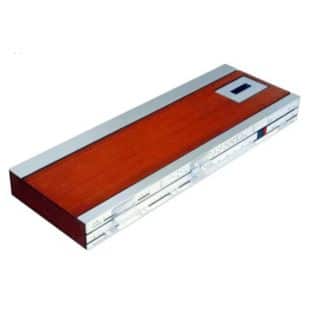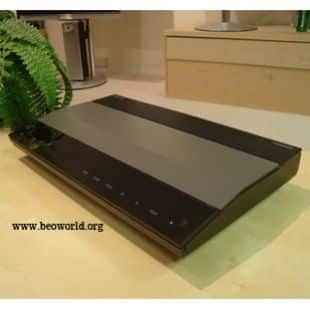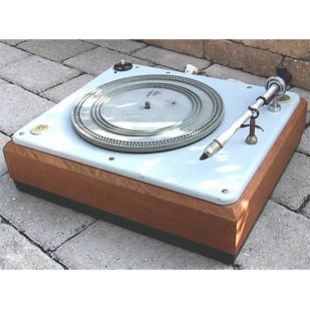BeoCenter AV5 therefore offered the best of both worlds and allowed you decide. At the touch of a button, two motor-drive loudspeakers stretched silently out to each side of the TV set. It was a simple, welcoming gesture but one that also ensures a special performance every time you switch on. The extra width allowed the loudspeakers to combine with the ear-shattering centre bass to produce optimal stereo sound in its full perspective. It was something you could hear – and feel – every time you watched a movie or listened to the in-built radio or played a CD. Indeed, BeoCenter AV5 was so versatile that at the time of its introduction, it could also play CD-i discs.
Devoting efforts in creating the perfect sound didn’t mean that Bang & Olufsen had forgotten what they knew about creating the perfect picture. On the contrary. The AV5’s 63cm super flat picture tube, combined with the contrast screen’s anti-reflective coating, delivered a sharper picture, with more depth and perspective, than you had ever seen before. So when the AV5’s electronic curtains glided open you could be sure that what lay behind them was pure entertainment.
Another original Bang & Olufsen feature added to daylight viewing comfort. It was a small electronic sensor that registered the prevailing light conditions in the room and adjusted the picture, so that it was always sharp, no matter whether a reading lamp was lit or sunlight suddenly poured through the window.
Touch CD on the Beo4 remote control and the AV5 moved on its motorised stand to face the viewer’s favourite viewing position. And active speaker stretched out from each side. On top, a CD player elegantly lifted open to allow you to drop in your CD and listen. The superior sound of the AV5 was made possible by the creation of a ‘soundscape’ that widened the perspective of the sound to make each individual instrument clear and distinct. Combined with an inbuilt, ear-shattering centre bass, the AV5 delivered a sound so rich and true that the effect was remarkably similar to a dedicated surround system.
Like every other Bang & Olufsen product, Beovision AV5 was designed and crafted with the greatest care. To ensure that the powerful centre bass unit didn’t interfere with the steadiness of the picture, it was mounted on an intricate suspension system, which in turn was anchored to a special aluminium chassis. The CD unit was perhaps the most robust then, on the market, to allow it to cope with the demanding environment – electronic noise, hot air and interference – in which it had to perform. And on top of all that, the entire unit was ‘torture tested’ hundreds of thousands of times to make sure that it could cope with the rigours of daily use!
Beovision AV5 construction
The rear of the AV5 is removed by undoing four screws. It may have taken some 150 tools and six construction engineers to make the parts and components, but as far as possible, one size of screw was used to assemble the AV5. The result was, up to 1999, the most advanced piece of electronic design ever to leave the Struer assembly line. Yet everything follows a strictly modular pattern, making maintenance and servicing logical and straightforward.
How can 15 centimetres make a world of difference if you’re already sitting in front of the television, ideally positioned between the stereo loudspeakers?
If you want the full perspective of, say a symphony and you want to be able to identify each instrument in the orchestra, a distance of 80 centimetres is the absolute minimum. You must also make sure that the loudspeakers deliver exactly the same performance and have the same harmonic balance. This can only be obtained by the painstaking measurement, trimming, and pairing of every single tweeter and baffle that goes into the AV5 (or into any other Bang & Olufsen loudspeaker for that matter). Some manufacturers obtain “spatial effect” by reversing the signal phase on one side. This creates a broader perspective, but makes it impossible to locate voices or single instruments.
Flat as a pancake
The picture tube was a new 25″ ‘super-flat state-of-the-art’ tube. It delivered excellent focus, which, combined with the anti-reflective coating of the contrast screen, was experienced as a sharper picture with more depth and better resolution.
The antlers
The fact the loudspeakers disappeared into the front wall, calls for a special bearing structure. In the AV5, the heaviest component was the picture tube, which was fixed to a set of aluminium “antlers”, a moulded aluminium space-frame which also carried the loudspeakers and most of the wiring. Cast in two pieces, it was custom-designed to hold wiring and fixtures that traditionally, would have been mounted with additional clamps and screws. Aluminium has the advantage of being light, but rigid and non-vibrating. It will not conduct sound or allow oscillations that could affect sound or picture reproduction.
‘Dance steady’ is a term that B&O takes dead seriously. It refers to a product’s ability to perform effortlessly, no matter how animated the surroundings. The company’s secret remedy is rubber suspension. Inside the AV5, almost every vital unit was isolated from the bearing structure by little rubber sleeves. The transformer, the CD print card, the CD drive and last but not least, the centre bass, since it was the source of a sizeable proportion of the vibration pattern. Dance steadiness is measured on a vibrating table to determine the design of each individual rubber sleeve.
On and on and on…
Imagine that you’d turn the AV5 on and off maybe 10 times a day over the next ten years and multiply that by 5 for safety. That’s equivalent to turning it on and off 180,000 times over 10 years. In B&O’s torture chambers in the dungeons in Struer, the loudspeakers on the guinea pig AV5 were stretched well beyond the first 500,000 times!
“It can’t be done”
Buffers, shielded cables and a couple of brave hearts went into one of the most challenging technical solutions in the AV5. To make room for the CD player in the upper corner, it was necessary to separate the drive from the control unit. In an environment as compact and loaded with “electronic noise” as the AV5, a lot of sources could create interference and laser is a fragile technology. Servo signals have to travel a longer distance and streams of hot air will not make working conditions any more stable. As a result, the AV5’s CD player was one of the most robust on the market at the time of the AV5’s production.
